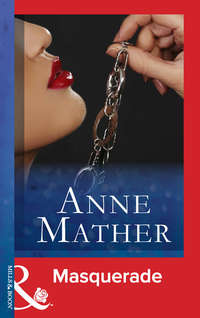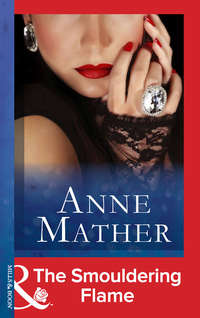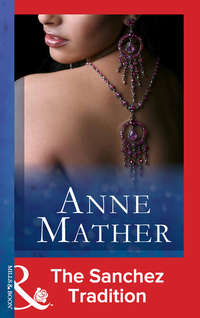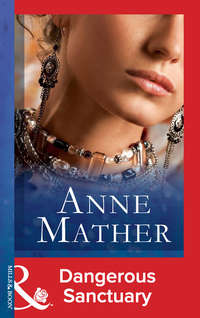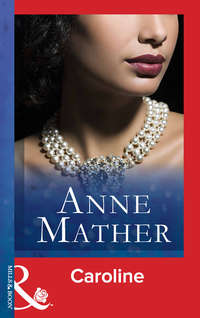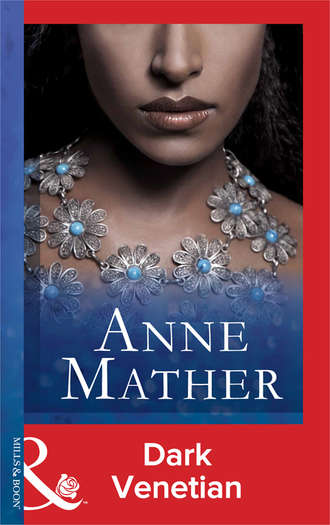
Полная версия
Dark Venetian
During Celeste’s time in the United States, Emma progressed to second-year nurse and the companionship she found with her contemporaries outweighed her lack of home life, welcome as she was to visit any of the girls’ homes. She worked hard, gained commendations from her seniors, and had really thought she had found a niche for herself at last, free from any fears of upheaval.
But six weeks ago she had developed a severe attack of influenza, which verged on the brink of pneumonia for several days, and when the crisis was past she was left weak and spent, and utterly incapable of coping, at least for several weeks, with the strenuous work of a junior nurse.
Matron had called her into her office and asked whether there was not some relative who might be willing to have her stay with them for a while until she was completely recovered, preferably, Matron said, away from the diesel-laden air of London’s streets.
Emma had not been able to think of anyone. Her frequent holiday visits to relatives from school, devised by Celeste, had stiffened annoyance in those relatives, most of whom had been her mother’s relations anyway, and although she had no doubt that they would take her if requested, she did not feel like sponging on them once again.
Matron had been unable to suggest anything at that time and the problem had been left in the air, until Celeste’s air-mail letter arrived from New York. It contained an invitation for Emma to accompany her stepmother on a visit to Italy for several weeks, the actual time was not specified, and notification that Celeste was flying home to London the following day, and could Emma meet her at the airport.
At first Emma felt affronted that after all this time Celeste should simply write and ask her to go away with her, and also issue instructions that she, Emma, should meet her at the airport.
But knowledge of her precarious financial position, together with a trace of curiosity without which she would not have been human, urged her to comply and she had taken a bus out to the airport and returned with Celeste in a taxi, a pile of new suitcases adorning the front seat.
Celeste’s invitation was re-issued in the lounge of a suite Celeste took at the Savoy, and Emma, in her white vinyl raincoat, and windswept hair, felt she must look more like Celeste’s maid than her stepdaughter.
She told herself that there must be some snags, that Celeste’s greedy nature could not change overnight, and that Celeste would hardly be spending all this money on her fares and accommodation for nothing, but for the life of her she could not see the flaws. And when Celeste took it upon herself to be charming and sympathetic that Emma should have suffered such a severe dose of ‘flu, she could be entirely disarming. At any rate, Emma was prepared to give her the benefit of the doubt particularly as, as she explained, Matron had forbidden her duties at the hospital for at least six weeks.
Celeste was triumphantly pleased at this state of affairs, and told Emma that in the circumstances there was no need for a prolonged delay. She would give Emma some money to attire herself in clothes suitable to the daughter of a wealthy woman, and after passport arrangements were made they would leave.
It was not until they had spent two days at the Danieli, during which time Emma had been left to her own devices to explore at will, that Celeste sprung on her the news that they were leaving the hotel and going to stay at a palazzo belonging to Celeste’s godmother, the Contessa Cesare.
And now, Emma, in the throes of restoring Celeste’s suitcases into some semblance of order, was wondering again whether she was about to discover the catch in all this. Just why had Celeste brought her? And why when she so obviously had intended visiting this Contessa had she decided she needed a companion? If it was a maid she wanted, she could have hired one far more cheaply than it was costing her to maintain her stepdaughter in a private room at the Danieli, and providing her with enough spending money so that no one might consider she was mean towards Emma.
Emma could not fathom it all. Why in any case did Celeste want to go and stay at some stuffy, old-fashioned palazzo, when she had the comfort and liveliness of this luxurious hotel? Emma felt sure that Celeste was not going to stay with the Contessa, whom she had described to Fmma as being at least eighty, for purely altruistic reasons. Celeste was just not like that! So why was she going there? Had the Contessa a son? And if she had, was he the reason for Celeste’s excitement at the invitation? After all, Celeste had everything else now, did the idea of a title impress her? And if this was so Emma again came back to the reasons for her own inclusion in the invitation.
The door of the suite opened, and Celeste came in, glowing and vivid, her emerald green silk sheath, clinging lovingly to the slender curves of her small, yet perfectly moulded, body.
‘Emma,’ she greeted her easily. ‘Have you finished packing yet?’
Emma rose to her feet. As she was five feet eight inches tall she always felt enormous beside the delicately framed Celeste, although she was quite attractively proportioned, and had none of the bony angles sometimes evident in tall girls who veer towards thinness.
‘Not quite,’ said Emma. ‘I was just taking a breather. Tell me, Celeste, are you quite sure you want me to come with you to this palazzo? I mean, I could just as easily stay here, or at some smaller, less expensive pensione.’
Celeste’s face assumed a strange expression, and Emma felt that awful foreboding in her stomach that she used to get whenever Celeste called her to her to tell Emma some new arrangement which had been settled for her. But now Celeste did not intimidate her, although she sometimes looked at Emma in this strange way, as though she was only there on sufferance.
‘Of course you will come with me,’ said Celeste now, firmly, her smile belying the coldness of her eyes. ‘We have both been invited, and naturally you will accompany me.’
Emma shrugged. ‘But why should the Contessa invite me?’ she persisted, and Celeste made an impatient movement.
‘You ask too many questions!’ she said irritably. ‘Where’s my lemon chiffon? I shall wear that for dinner this evening. The Contessa is joining us here for the evening, and we’ll leave the hotel tomorrow morning for the Palazzo.’ She turned away, studying her reflection satisfactorily. ‘By the way, you’ll be dining with us this evening.’
Since their arrival at the Danieli, Emma had dined in her room, leaving their table in the dining-room to Celeste, who liked the mystery she created around herself, and liked to know everyone was speculating about the lovely widow who sat alone at her table every evening.
Emma’s eyes widened now, but she made no further comment. The mystery deepened, and a faint suspicion was dawning within her that Celeste wanted to impress this Contessa with her affection towards herself. But why? Unless the Contessa had expected that Celeste would take care of her stepdaughter when Charles Maxwell died.
Could this be the link she was seeking? Emma wondered. It was painfully true that until now Celeste had considered Emma an encumbrance, the sooner to be rid of, the better.
Emma wore a pink linen gown that evening, which while having cost Celeste quite a large sum was nevertheless very simple in design, and did not entirely suit Emma’s fair colouring. She suited more definite colours rather than pastel shades, and in her present mood of suspicion, Emma couldn’t help but wonder whether Celeste had chosen her clothes more to detract from her attractiveness than to add to it.
It was true that in the past she had not had a lot of money to spend on clothes, but those she had were serviceable and youthful, and she had never before had this feeling of being quietly manoeuvred into anonymity.
The Contessa arrived on the dot of eight and Celeste and Emma met her in the downstairs lounge. Emma thought she had never seen a more regal person in her life, and as both Celeste and the Contessa were so small she felt doubly at a disadvantage.
However, the Contessa was in a mood to be charming, and when the introductions were over, and they had ordered a pre-dinner aperitif, she turned from her minute questioning of Celeste, to Emma, and said:
‘And you, my dear; how do you find your sudden change of fortune?’
Emma glanced at Celeste, and then shrugged disarmingly.
‘I … er … it’s very different from the hospital,’ she said uneasily.
Celeste’s fingers gripped her arm warningly.
‘Hospital?’ said the Contessa, frowning. ‘You have been in hospital, my dear? But this is very unfortunate at your age.’
‘I … w …’ began Emma, but the grip on her arm was painfully tightened.
‘Did I not tell you in my letter that Emma had had a severe dose of flu’?’ Celeste was saying swiftly. ‘It almost turned to pneumonia, and of course hospital was the safest place.’
Emma stared at her stepmother in amazement. If she had needed any confirmation of her earlier suspicions, surely this was it!
‘No, my dear Celeste,’ said the Contessa, as Celeste relaxed her grip on Emma’s arm. ‘You did not tell me. But no matter. How fortunate it was that you were coming to Italy. You will find recuperation here far more enjoyable than in London I venture to say. I know that country very well, and the climate appals me!’
Emma swallowed hard, unable to think coherently for a moment.
‘Your English is excellent, Contessa,’ she murmured awkwardly, unable for the life of her to think of anything else to say, and she knew she was expected to say something.
‘Thank you, my dear. I have always thought so, myself.’ The Contessa smiled. ‘Come, drink up your martini. I think it is time we went in for our meal.’ She slid an arm through Celeste’s. ‘And now, my dear, you must tell me everything. I want to know all about these two late husbands of yours, and whether you are thinking of marrying again. At thirty-three your life has barely begun. We must try to make your stay an unforgettable one.’
Emma felt stunned. She wanted to plead a headache, which she surely had, and leave them for a while to gather her scattered wits, but her innate sense of decency would not allow her to insult the Contessa in this way. Besides, she knew well what Celeste’s reaction would be if she suddenly found her stepdaughter trying to escape from the evening’s entertainment.
So she went in to dinner, and toyed with her food while she listened to the conversation going on between the Contessa and her stepmother. The meal was delicious; the minestra, a soup made of vegetables and herbs, was both aromatic and tasty, but Emma hardly noticed what was on her plate. Even the sweet dessert failed to arouse her from the lethargy into which she had sunk. To her relief, the Contessa addressed most of her remarks to Celeste, so she was saved of the need for more lies, although Celeste was not averse to embroidering the truth to suit her own ends, as well as altering circumstances completely should she find it more in her interests to do so.
‘Poor Charles,’ she was saying. ‘He was still a young man when he died, barely fifty-three, and so charming!’ She glanced at Emma. ‘Naturally, Emma and I shared our grief together, and I think we helped one another at that awful time.’
‘Of course.’ The Contessa was understanding. ‘It is always an unhappy time, and you were lucky to have a companion so near your own age. After all, my dear, you could not by any means be taken for this child’s mother! You look ridiculously young yourself, and you could almost be taken for sisters.’ The calculating look she gave Emma as she said this implied more implicitly than words that she considered Celeste far too attractive and delicate to have such an opposite for a daughter.
‘Emma and I are good friends,’ said Celeste, looking again at Emma, as though daring her to deny this statement, but Emma was too absorbed to care.
And, as the evening wore on, she wondered why she cared anyway. After all, she had never been left in any doubt as to Celeste’s feelings towards herself from the time she was sent away to boarding school, and she had only assumed she was being taken on this trip as a kind of maid-companion, so what did it matter if Celeste chose to act as though she were the fairy godmother who had taken Emma from a life of prosaic existence, to the elegant world of palaces and countesses and riches?
It seemed logical to suppose that Celeste wanted to appear as Emma’s saviour and mentor, and the Contessa with her obvious pride in family would hardly consider a woman who had abandoned her stepdaughter without regret two or three years ago as a fit and proper member of her society.
Emma was not a fool, whatever Celeste might think, and chances of free holidays, although they might not come every day, should not be sufficient to warrant the deliberate deceiving of an old lady. For that was what Celeste was doing, there was no doubt about that. And the reasons would no doubt become evident if the present Count chose to make an appearance. Middle-aged, ugly, debauched; he might be any or all of these things, but Celeste, who had not baulked against marrying a man already in his seventies in the United States for the sole and obvious purpose of gaining a wealthy position in society, would hardly consider any of these things important when compared to the noblesse she would achieve by calling herself the Contessa Celeste Cesare.
Emma felt sickened, and ashamed. By even being here she was allying herself in the deception, and all thoughts of the pleasure she herself might gain from this free holiday were banished by embarrassment of the situation. She would tell Celeste as soon as they got back to their suite that she was going home, and Celeste could move into the Palazzo tomorrow and do whatever she liked without any assistance from her.
The Contessa suddenly turned her attention to Emma. She studied her for a moment, and then said:
‘How are you liking your visit to Venice, my dear?’ She smiled. ‘Are you interested in old buildings and museums and art galleries? Or are you more enamoured of the Lido, and the calm blue waters of the Adriatic?’
Emma gathered her thoughts. ‘I think it’s a beautiful place,’ she replied politely, none of her earlier enthusiasm now evident, and Celeste looked curiously at her. ‘Of course I’ve already visited the Doge’s Palace, and this morning I had coffee in one of those outdoor cafés in St. Mark’s Square.’
‘Ah, yes, the Piazza San Marco. And did you go into the Basilica?’
‘Unfortunately, no. I didn’t have the time to explore it properly, and I didn’t want to have to rush it.’
The Contessa clasped her hands. ‘I can see you do find pleasure in beautiful things. That pleases me. My family used to have a great collection of paintings and sculptures, but alas, many of these have had to be sold, but that does not prevent me visiting the art galleries, and the churches where there is a veritable fortune in famous art treasures to be seen and gloated over.’ She laughed, and turned to Celeste. ‘Your mother and I used to spend hours in the Louvre when we were young students. Did she tell you?’
Celeste hesitated. ‘Of course, dear Aunt Francesca,’ she said smoothly, but Emma felt sure that this was just more of Celeste’s lies. She herself had been unable to prevent the surge of excitement that talking about such world-famous masterpieces could arouse, and the Contessa’s knowledge, strengthened by years of exploration and interest, would have enthralled her for hours. It was a pity that tomorrow she must return to London, and try and forget this almost unforgettable interlude.
When dinner was over, Emma excused herself thankfully. Now at least she could leave without arousing Celeste’s annoyance, for she felt sure her stepmother wanted to be alone with the Contessa to pursue whatever reason had brought her to Venice in the first place.
Emma went up to her room, collected a light wrap, and went downstairs again. If she was leaving in the morning, she intended enjoying as much of her final evening as was possible. She didn’t particularly care that it was not the thing for an unescorted young girl to venture out alone on the streets of Venice, particularly as Italian men were noted for their amorous advances.
But Emma felt perfectly capable of handling any would-be suitor and she ignored the admiring glances cast in her direction, and the casual greetings sometimes flung across at her.
The Riva degli Schiavoni was crowded even so early in the season, and gondolas were departing at intervals from the landing stage taking couples for an unforgettable trip along the canal, the gondolas with their lights glinting in the dusk.
The shops were closed now, but the numerable cafés were still open, and Emma was tempted to go in and ask for coffee, but in this her courage defeated her. She had not brought her purse with her or she might have hired a gondola herself, despite the extravagance, for there at least she would be free of the necessity of continually looking away from bold dark eyes.
She returned to the hotel at last, depression beginning to invade her consciousness. She still had Celeste to face, and it was not going to be pleasant. She could remember in the past the viciousness of Celeste’s temper when she was crossed.
She reached the Danieli, and was crossing the foyer unseeingly, when she was brought up unexpectedly against the chest of a man coming just as self-absorbedly from the bar. She stepped back awkwardly, her cheeks flushed, and a ready apology on her lips. But the man forestalled her, his inbred courtesy always in evidence.
‘ Scusi, signorina. Si lo un mio sbaglio.’
‘Non importa, signore,’ Emma murmured, swiftly, a smile lifting the corners of her mouth as her eyes encountered the light blue gaze of the man confronting her, and as his experienced appraisal of herself was taking place she found herself studying him just as intently.
There was something about him which she felt set him apart from the other Italian men she had encountered this evening. That he was Italian she was left in no doubt despite the fact that he was easily six feet in height, which is tall for an Italian. He was lean, but his shoulders were broad and belied the casual elegance of his dinner jacket. She felt sure he was not simply a sybarite, although he looked completely at ease in these luxurious surroundings. His skin was darkly tanned for a European, as though he spent much time outdoors, and his lashes were the longest she had ever seen on a man and were the only effeminate thing about an otherwise completely masculine face. She supposed some women would call him handsome, but his attraction did not rely on good looks, but rather on a magnetic kind of charm which surrounded him leaving a woman completely aware of her own femininity. He was much older than Emma, anywhere between thirty-five and forty-five, with a kind of agelessness that utterly disarmed Emma. She had never been attracted to older men; boys of her own age had always seemed much more fun than the older doctors at the hospital but suddenly all her earlier opinions seemed to go through a swift revision, and she realized she really had had very little experience of life.
The man smiled now, and said: ‘Parla lei Italiano?’
Emma sighed. ‘No.’ She shrugged. ‘Only phrase-book Italian, anyway.’
‘So.’ He spoke English now with only a slight accent. ‘You are English. Tell me, did I hurt you?’
Emma shook her head, ignoring the fact that when she had stepped back so precipitately someone had kicked her ankle and it was really quite painful now.
‘Good, good. You are holidaying here, signorina?’
‘Yes, signore.’ Emma nodded, and then realizing she was allowing herself to be ‘picked up’ as they say in England, she began to move away, but the man stopped her, a light hand on her arm, his fingers hard and cool.
‘Don’t go, signorina. Allow me to buy you a Campari, if only to show that you accepted my apology.’
Emma shook her head. ‘Thank you, but no, signore. My … my friends are waiting for me. I must go. And of course I accept your apology. It was as much my fault as yours.’
The man’s eyes were amused. ‘Very well, but at least tell me your name.’
Emma smiled. ‘All right. Emma Maxwell.’
‘Bene. Arrivederci, signorina.’
‘Good-bye.’ Emma walked resolutely across to the elevator, but she felt supremely conscious that his eyes followed her, and felt a leap of something like excitement inside her at the possible prospect of seeing him again.
It was not until she gained the sanctity of her own room that she remembered her earlier decision to tell Celeste that evening that she was leaving in the morning. Emma faltered, and walked across to her dressing table mirror, drawn by a desire to see her reflection, to study it appraisingly, and just how stupidly she was behaving. What would a man like that want with an idiot teenager like herself? If she had been madly beautiful like Celeste, there might have been some reason for her to feel this mad surge of happiness, but she had nothing in particular to commend her. Her hair was blonde, it was true, but it was disappointingly straight and at the moment hung over her shoulders in silky strands; her complexion was fair, but would soon tan in the hot sun; and her eyes which she had always considered her best feature, large and wide-spaced and most definitely green, had lashes which were nowhere near as long as that man’s. And finally she came to the pink gown; it really did do nothing for her whatsoever, and she decided that whatever happened, first thing in the morning she would visit one of those small markets, that abounded in the tiny alleyways among the canals, and buy some material and cottons and run herself up a couple of dresses in colours which she knew suited her. A vivid red, perhaps, and that gorgeous shade of kingfisher blue.
But first of all there was Celeste, and somehow now the desire to escape from Venice at the first opportunity seemed to have lost its appeal.
CHAPTER THREE
CELESTE did not come up to the suite until well into the early hours of the morning, and when she did she was humming softly and smugly to herself as though well pleased with the evening’s happenings. Emma had sat up reading until midnight, and then she had gone to bed to lie awake wondering what on earth Celeste was doing. Surely the Contessa did not keep these hours at her age.
Emma slid out of bed, and wrapped a quilted dressing-gown about her slim body. Then she quietly opened the door of her bedroom and entered the lounge of the suite. Celeste had just lit a cigarette, and was standing smoking, a lazy smile on her face.
She started, almost guiltily Emma thought, at her stepdaughter’s appearance, and said:
‘Emma! What in heaven’s name are you doing, creeping around at this hour of the morning?’
Emma shrugged her shoulders, and advanced into the room. ‘I … I couldn’t sleep,’ she said casually. ‘Celeste, I’m thinking of going home tomorrow … or I mean today, actually.’
Celeste’s expression altered considerably. ‘Home? You mean to England?’
‘Yes.’ Emma hugged herself nervously. ‘I … I don’t know what lies you’ve been telling about our relationship, but I’m certainly not prepared to deceive that sweet old lady by any more of it …’
Celeste stared incredulously at her, and then she laughed scornfully. ‘That sweet old lady, as you called her, happens to care more about money than my deficiencies,’ she snapped. ‘Has it dawned on your naïve intelligence that the reason I’m here is to grab myself a title, and in the subsequent process restore the Cesare family fortunes?’
Emma flushed. ‘I’ve been working it out,’ she admitted slowly. ‘But it can’t be as simple as that, Celeste, or you wouldn’t have bothered to bring me along, would you?’




